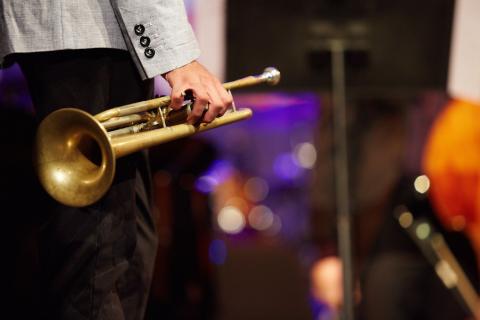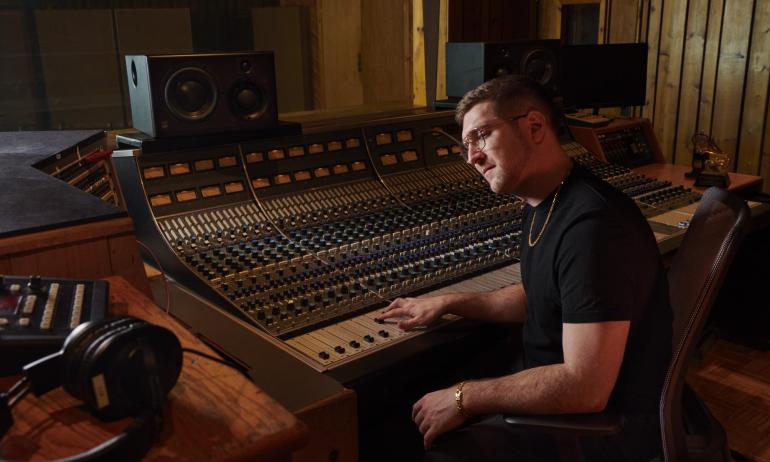How to Support Artists During the COVID-19 Outbreak

As venues, tours, and festivals shut down in response to aggressive public health measures aimed at flattening the COVID-19 curve, musicians who rely on live gigs for revenue are among the groups hardest hit by the economic fallout of the coronavirus pandemic. That burden is being felt throughout the industry, from major artists and event producers to touring indie bands trying to grind out a living, to student bands at Berklee looking for a break.
“We’ve taken a pretty huge hit as far as income goes,” says James Duncan, a contemporary writing and production major at Berklee and a member of the student band Raavi & the Houseplants. “We really make most of our money and spend most of our time playing shows.” The band was slated to play a handful of dates in Austin, Texas, this month during the South by Southwest festival, but they canceled as it became clear that the festival would not go forward this year. “I know a few other bands who had to cancel much bigger plans, like career-changing stuff," he says, "and my heart goes out to them.” But Duncan takes some solace in the fact that the band is not alone, and that the measures being taken now are being undertaken for the best of reasons. “Cancelling our dates was heartbreaking. All musicians are in the same boat, however, so I’ve found comfort in that. It’s kind of beautiful how quickly everyone came to be on the same page in solidarity with our communities’ most vulnerable members.”
The economic and professional fallout is not limited to the artists themselves. Jeff Dorenfeld, a professor in the Music Business/Management Department at Berklee and the founding managing director of the Berklee Popular Music Institute, notes that “the tour personnel who support large tours and shows… are also out of work until the tour is able to ramp up and start, which is obviously an unknown. Under a normal cancellation, musicians and support personnel could find other jobs to carry them over, but businesses including restaurants, clubs, bars, etc… are also shutting down.”
Of course, many beyond the music industry will find themselves hit hard over the coming weeks and months by these extraordinary circumstances of social distancing and restricted travel. It will be up to all of us through this period to seek out ways to strengthen our communities—local, national, and global; economic and artistic. So, if you find yourself with time or funds to spare, and you’re looking for a way to support musicians and industry professionals affected by this crisis, here are some places to start:
1. Buy Music (and Be Mindful of Where You’re Getting It)
To cope with the disappointment of your favorite act cancelling their tour, consider buying one of their albums online. The revenue from album sales greatly outstrips the revenue most artists see from streaming—even more so if you seek out those artists on an e-commerce site such as Bandcamp, which takes a smaller cut of the sale than many online retailers, allows artists to set their own prices, and allows purchasers to pay more than the asking price if they so choose. "The quickest way to put money in your favorite bands’ pocket is to buy stuff on Bandcamp, because they only take a small fee, and that has historically been the biggest source of online revenue for us,” says Duncan.
2. Keep Streaming
While it’s true that revenue from sources such as Spotify or Amazon Music often amounts to fractions of a penny per play, there’s no denying that those fractions can eventually add up. “We are touring musicians dependent on gigs (social gatherings of preferably 50+ people) for our livelihoods. Passive income like streaming and internet sales is not reliable, but in times like these it is greatly appreciated,” explained Berklee alumni band Lula Wiles (Eleanor Buckland ’15, Isa Burke B.M. ’16, Mali Obomsawin ’14) in an Instagram post this week. Many people will find themselves in difficult financial situations in the coming weeks; if it’s all you can do to press play on some beloved underground artist’s latest release, know that it helps.
3. Stay Connected
It could be that we are about to witness music's livestreaming renaissance. Artists are looking for new ways to connect with their fans across this new social distance, and, Dorenfeld says he’s already seeing “artists reach out in creative ways. Chris Martin of Coldplay developed a concert series from home via Instagram Live.” As did John Legend. Ben Gibbard of Death Cab for Cutie is livestreaming a solo acoustic set from his Washington home every afternoon for two weeks. Metalcore band Code Orange streamed a full concert at an empty venue on Twitch. As time goes on, artists will continue to reach out to fans through online performances. Reach back. And if they ask for a donation for the performance and you have the means, consider chipping in.
4. Donate to Venues and Artist Relief Funds
Berklee's Career Center has published a list of funds and resources for artists affected by the pandemic and those who wish to contribute to them. In addition, many communities have already set up fundraising pages dedicated to supporting musicians and industry professionals through the COVID-19 crisis, and local venues and theaters in the Boston area including Great Scott, O’Brien’s, and ONCE Somerville are raising funds online to support their employees. You can visit WBUR's the ARTery for more information on fundraising efforts in Boston, or see NPR’s extensive rundown of nationwide funds and other ways to support artists and music industry workers nationwide.




